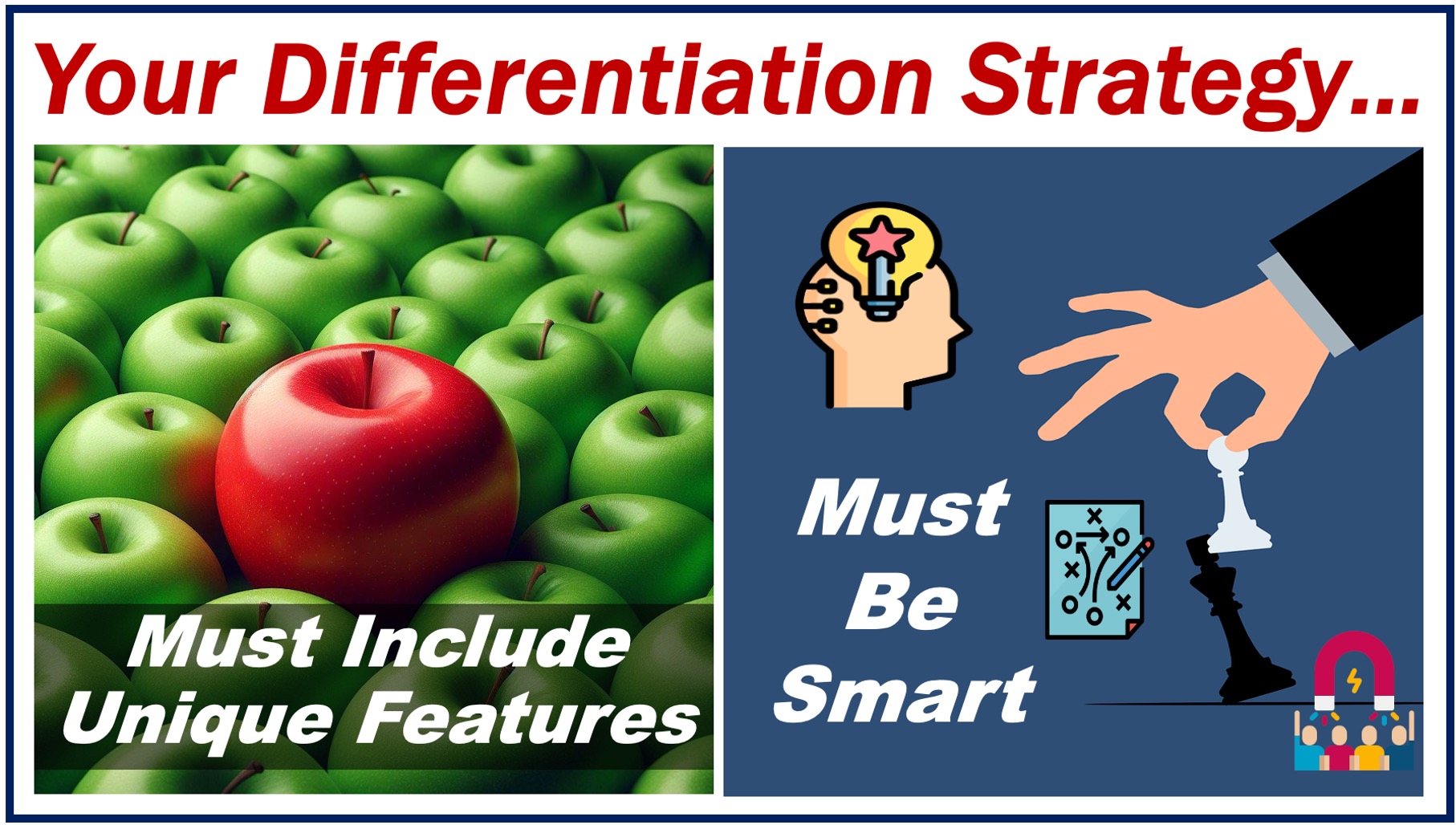If you are trying to find a strategy that makes your products, services, or overall brand stand out in a sea of competitors, you are creating a Differentiation Strategy.
Simply offering good products and services in today’s fiercely competitive marketplace is not enough. You need a strategy that makes your company stand out from the crowd. It involves identifying and developing your business’s key aspects, especially those that consumers value and that your rivals cannot easily replicate.
Differentiation lies at the heart of creating a successful business strategy.
The concept of differentiation has its roots in mathematics and science, where it is a way to determine how a change in one variable affects another. For example, in botany, it could mean observing how changing the amount of light affects plant growth.
This article focuses on the term ‘differentiation strategy’ and its application in the world of business.
The Eaton Business School has the following definition of the term:
“Differentiation strategy is a business approach where organizations make a unique and distinct offering to their customers to stay ahead of their market competitors.”
“The main objective of implementing a differentiation strategy is to increase competitive advantage. This strategy can be accomplished by strategically analyzing the internal strengths and weaknesses of the business and effectively allocating them to enhance the overall value of delivery.”
Benefits of a differentiation strategy
-
Pricing Power
Differentiation allows you to charge premium prices, as customers see value beyond the product itself. For example, Apple charges higher prices for their iPhones due to perceived innovation, ecosystem integration, and brand prestige.
-
Customer Loyalty
Unique offerings build loyalty, reducing customer churn and increasing lifetime value. ‘Customer churn’ means the rate at which customers stop doing business with an entity. It is the opposite of customer retention. If customer loyalty is high, customer churn is low.

-
Competitive Advantage
A strong differentiation strategy protects your market share, making it harder for competitors to copy your success.
Differentiation can elevate your brand’s recognition in the marketplace. When customers, prospects, and consumers in general associate your unique qualities with your brand, it stands out more vividly in their memory.
With a differentiation strategy, you will be able to target specific market segments more effectively. By tailoring your product or service to meet the unique needs and preferences of a particular group of consumers, you can capture and dominate niche markets.
How you can create different strategies
Here are some key ways you can achieve this:
-
Superior Products/Services
Offering unique features, higher quality, or superior performance will set you apart.
Dyson, for example, has set its vacuum cleaners apart by introducing cordless convenience, superior suction performance, durability, and cyclonic separation technology.
-
Branding and Image
Create a strong brand identity that resonates with your target market on an emotional level.
In other words, build a narrative and visual presence that your customers can identify with, trust, and feel a part of, which in turn fosters a deeper connection and brand loyalty.
-
Exceptional Customer Experience
Provide customer service and support that exceeds expectations, leading to lasting customer relationships.
This may include personalized services, responsive after-sales support, customer engagement programs that make each customer feel valued and heard, and ensuring help is always available with 24/7 customer support.
-
Innovation
Be a pioneer in your industry with new products, services, or business models.
Companies like Tesla, which has led the way with electric vehicles, and Netflix, which revolutionized entertainment by pioneering streaming services, are two examples of leadership through innovation.
-
Strategic Partnerships
Taking part in joint ventures or alliances with other businesses can help extend your market reach, share resources, or co-develop new products. In such partnerships, the combined effect if often is greater than the sum of individual efforts.
The Spotify and Starbucks partnership, which began in 2015, serves as a notable example, where Starbucks integrated Spotify’s streaming service to enhance the in-store experience. This cross-promotion benefits both companies.
Differentiation in Finance and Economics
-
Financial Markets
Investors are attracted to companies with strong differentiation strategies, as they often promise higher returns or lower risk.
Amazon, for example, has consistently innovated in e-commerce, cloud computing, and AI technologies, which has attracted investors due to the company’s potential for growth and market dominance.
-
Market Analysis
Economists study differentiation to understand how companies compete, set prices, and how markets evolve overall.
Final thoughts
Building a successful differentiation strategy involves deep market research, understanding your unique strengths, and continually evolving to stay ahead.
It’s a balancing act – your product or service needs to be different enough to stand out, but still appealing to your target customers.
If the world’s most successful companies expend considerable resources on crafting their differentiation strategies, don’t you think you should too?
